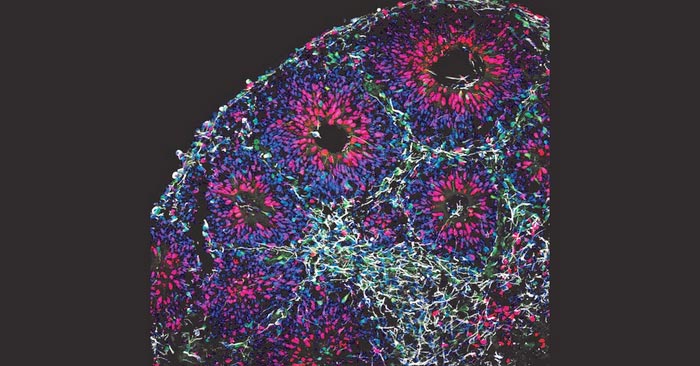Brain organoids reveal in detail the harms of prenatal alcohol exposure

Lab-grown brain organoids help researchers explore early stages of human brain development.
Credit: UC San Diego Health Sciences
No amount of alcohol consumption is safe for a developing fetus; a new study presents in molecular detail how alcohol harms growth and functioning of developing brain organoids.
Alcohol consumption during pregnancy poses significant peril to the healthy development of the unborn child. There is no known safe amount of alcohol during pregnancy.
The consequences of prenatal alcohol exposure (PAE) are reflected in the different diagnoses that emerge under the umbrella of fetal alcohol spectrum disorders. At one end of the spectrum, growth deficits and physical differences define fetal alcohol syndrome (FAS), but in most cases, irreversible brain damage leads to behavior and learning challenges even without a physical impact. Experts estimate that 1.1 to 5 percent of U.S. schoolchildren — as many as 1 in 20 — may be affected by PAE, with some percentage experiencing FAS.
Although the clinical effects of fetal alcohol spectrum disorders are well documented, the precise molecular effects on the human fetal cerebral cortex are not fully understood. In a new study, published November 16, 2022 in Molecular Psychiatry, researchers at University of California San Diego School of Medicine used human brain organoids to more specifically document how alcohol exposure impairs the development and functioning of new brain cells.
“The findings underscore the broad threat of alcohol exposure to the fetal brain. The harm inflicted is profound and extensive,” said Alysson R. Muotri, PhD, professor in the Departments of Pediatrics and Cellular and Molecular Medicine at UC San Diego School of Medicine.
Muotri is co-corresponding author of the study with Cleber A. Trujillo, a former project scientist in Muotri’s lab and now associate director of stem cell biology at Massachusetts-based Vesalius Therapeutics.
Using human induced pluripotent stem cells, Muotri and colleagues created three-dimensional brain organoids that develop similarly to human fetal corticogenesis — the formation of the outer layers of the brain that house many high-level functions, such as reasoning, conscious thought, emotional control and speech.
Alcohol exposure at different points of fetal brain development resulted in different but invariably negative effects, from fundamental dysfunction of cellular processes, to faulty construction of brain architecture and inadequate creation of support cells (gliogenesis) and connections between brain cells (synaptogenesis).
The researchers followed up by conducting electrophysiology recordings to monitor electrical activity patterns in the cortical organoids, documenting and confirming impaired cortical organoid function.
The authors said the findings improve upon previous studies using animal models.
“They overcome the suboptimal recapitulation of non-human models,” said co-author Miguel Del Campo, MD, PhD, associate professor at UC San Diego School of Medicine and medical geneticist at Rady Children’s Hospital-San Diego. “In fact, they show organoids are a valuable model for better assessing, more fully and deeply, the effects of alcohol exposure on the developing human brain.”
Co-author Kenneth L. Jones, MD, professor of pediatrics at UC San Diego School of Medicine, elaborated: “That is crucial because we can better see what prominent growth and signaling pathways are disrupted and perhaps discover new targets to therapeutically impede or prevent the neuropathology of prenatal alcohol exposure. The good news is that some of these alterations were reversed using specific experimental drugs.”
Co-authors include: Jason W. Adams, Priscilla D. Negraes, Justin Truong, Timothy Tran, Ryan Szeto, Carmen Teodorof and Stephen A. Spector, all at UC San Diego.
Journal: Molecular Psychiatry
DOI: 10.1038/s41380-022-01862-7
COI Statement: Alysson Muotri is co-founder and has an equity interest in TISMOO, company dedicated to genetic analysis and human brain organogenesis focusing on therapeutic applications customized for autism spectrum disorder and other neurological disorders with genetic origins. Muotri is a co-founder for Lizarbio Therapeutics and has equity.
Media Contacts
Scott LaFee
University of California – San Diego
slafee@ucsd.edu
Office: 858-249-0431
Nicole Mlynaryk
University of California – San Diego
npmlynaryk@ucsd.edu
Office: (858)-249-0419
Cell: (201)-245-8955
All latest news from the category: Health and Medicine
This subject area encompasses research and studies in the field of human medicine.
Among the wide-ranging list of topics covered here are anesthesiology, anatomy, surgery, human genetics, hygiene and environmental medicine, internal medicine, neurology, pharmacology, physiology, urology and dental medicine.
Newest articles

Innovative 3D printed scaffolds offer new hope for bone healing
Researchers at the Institute for Bioengineering of Catalonia have developed novel 3D printed PLA-CaP scaffolds that promote blood vessel formation, ensuring better healing and regeneration of bone tissue. Bone is…

The surprising role of gut infection in Alzheimer’s disease
ASU- and Banner Alzheimer’s Institute-led study implicates link between a common virus and the disease, which travels from the gut to the brain and may be a target for antiviral…

Molecular gardening: New enzymes discovered for protein modification pruning
How deubiquitinases USP53 and USP54 cleave long polyubiquitin chains and how the former is linked to liver disease in children. Deubiquitinases (DUBs) are enzymes used by cells to trim protein…



